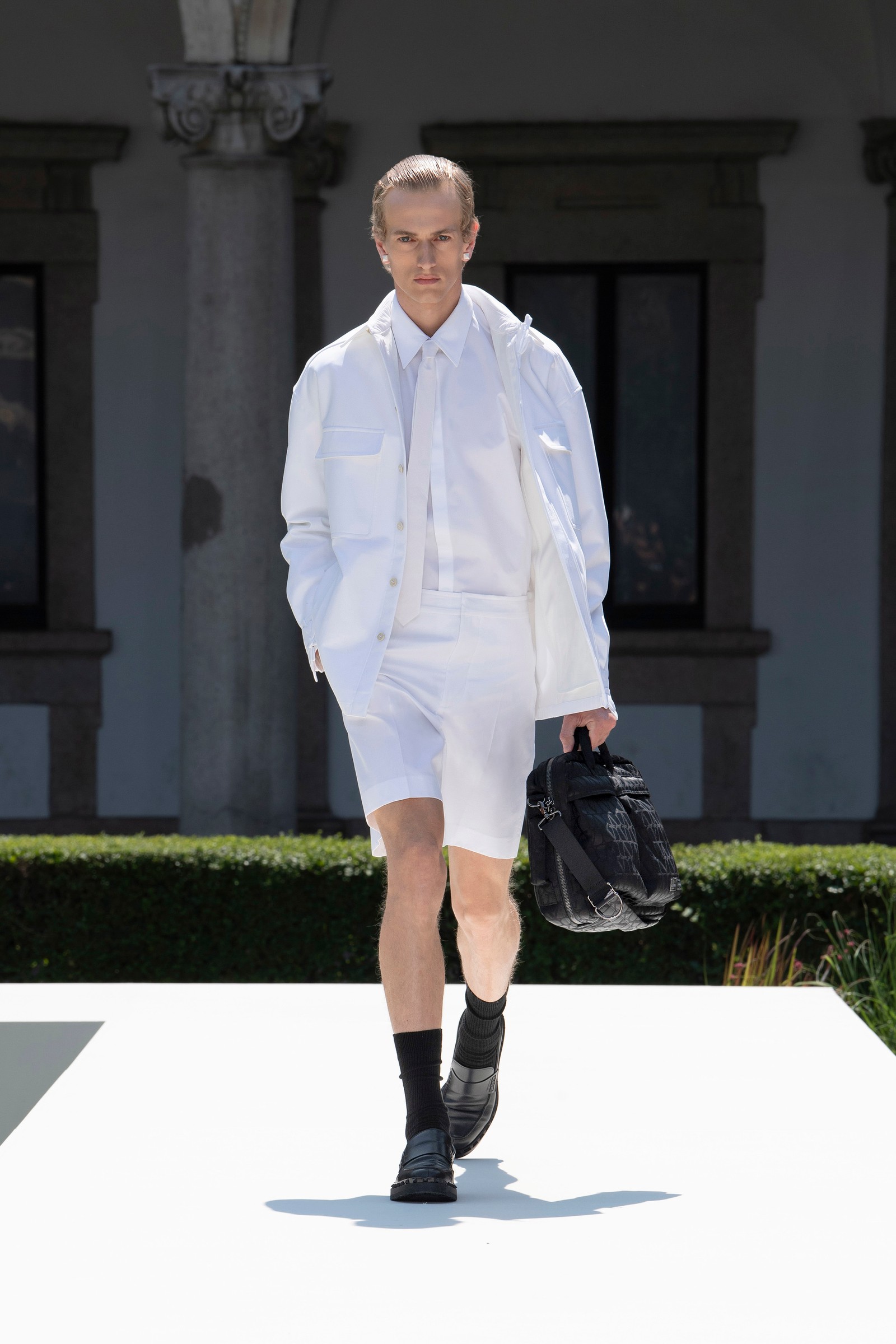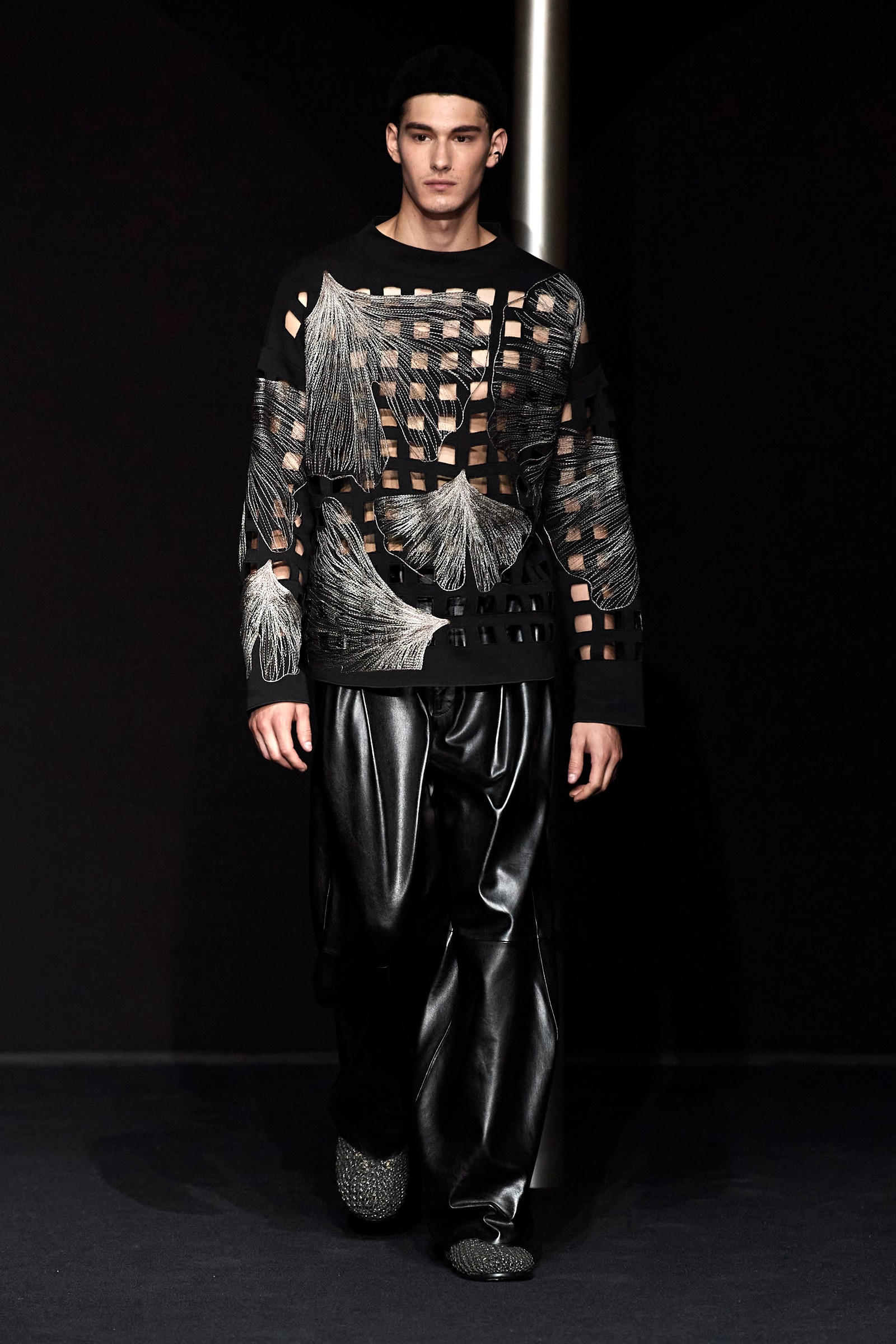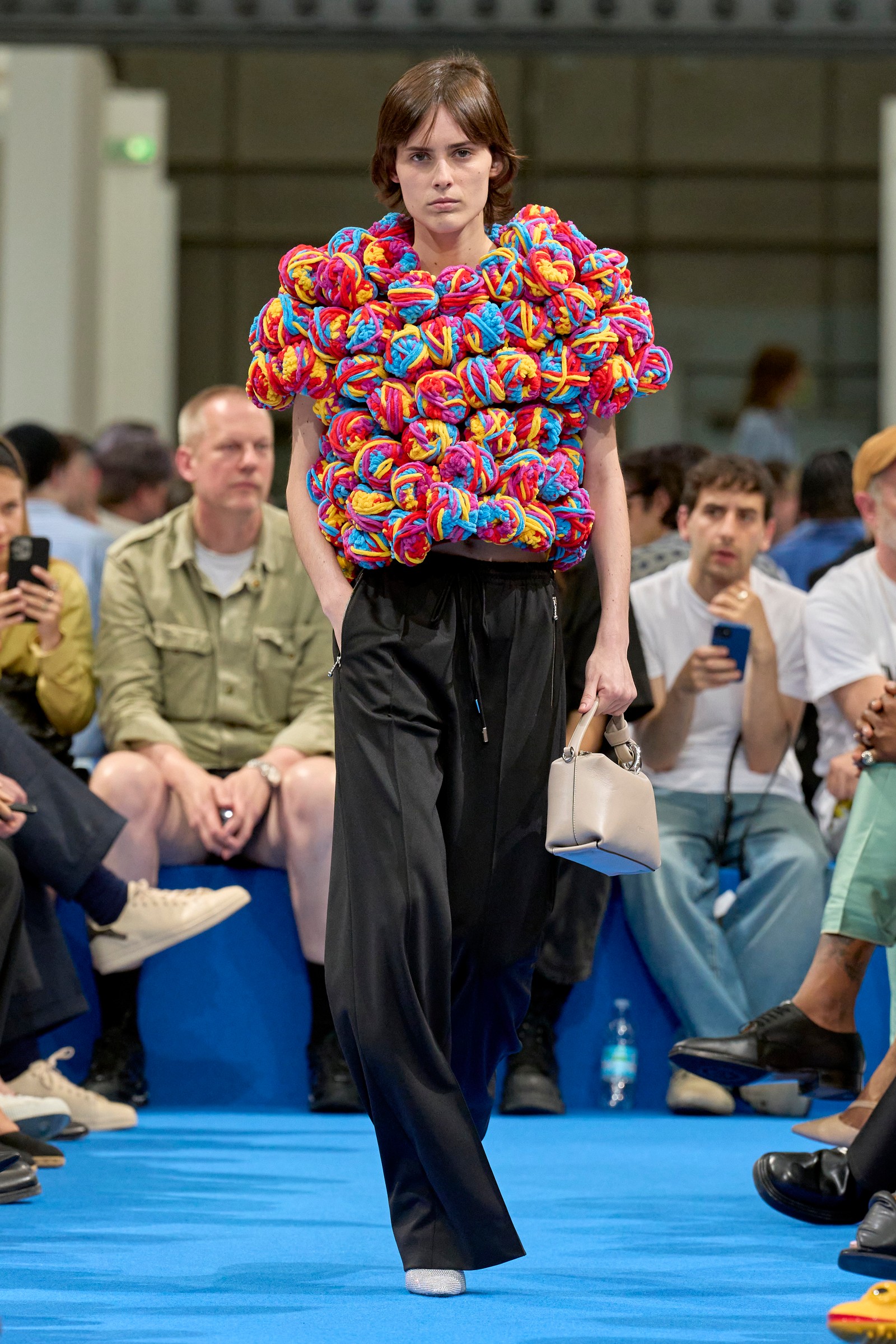Ciao amori! Another week, another, well, fashion week! Yes, after rolling on from Pitti Uomo, we spent our weekend seeing shows and sipping spritzes in Milano – no, not just for the sake of it, but for Milan Fashion Week Men’s, of course! From Valentino’s return to the calendar to stellar shows from British imports JW Anderson and Charles Jeffrey LOVERBOY, there was a hell of a lot to process – but, lucky for you, you don’t need to worry about rubbing those brain cells together to figure out what it all means, cos we’ve gone and done the hard work for you. Here’s everything you need to know from Milan Fashion Week Men’s best shows.

Valentino

Valentino
The inspiration for Valentino’s menswear collection was unexpected, to say the least: Hanya Yanagihara’s 2015 novel A Little Life. For anyone who has read the epic tome, you’ll know that it’s not exactly an uplifting tale. Instead, Valentino’s Pierpaolo Piccioli chose to use the text as the basis for an examination of shifts in masculinity, drawing from the lines “things get broken and sometimes they get repaired. And in most cases, you realise that no matter what gets damaged, life rearranges itself to compensate for your loss, sometimes wonderfully.” It led him to stage a show in the garden of La Statale, Milan’s public university. Students were invited to watch the show from the courtyard and treated to a live performance by indie-rap artist d4vd. Many of them have probably read A Little Life, and like them, you might be asking, how exactly does a depressing tale of pain and abuse materialise as a collection from one of Italy’s few couture houses?
A handful of all-white looks opened the show, perhaps symbolising innocence and purity. Then came a suite of sombre black tailoring, worn over the buttoned-up shirts and ties of conventional manhood, only to be followed by what Pierpaolo does best: those zingy colour combos, floral intarsias, and that artful balance of voluminous structure and slightly ethereal romanticism. Floral motifs apparently symbolised life, their stems lining the fastenings of boxy shirts with petals blooming from collars, almost like ties. The Japanese concept of Kintsugi — meaning ‘golden seams’ and describing the careful reparation of imperfect or broken objects — seemed to inform the patchwork intarsias and blink-and-you-miss it appliqués. More literally, quotes from Yanagihara’s pages were printed across a black tailored suit and at the front of a pair of denim trousers, and a handful of bags made in collaboration with Japanese brand Porter. One of them read “We are so old, we have become young again.” An apt metaphor, perhaps, for the way that some of the oldest tricks in the book, sartorially speaking, can be reinvigorated to feel fresh again. Masculinity may be changing, but there’s never been more incentive to put on a suit and tie.

Emporio Armani
“Moonlight glints over a seascape, parched rocks and desert scenes,” opened the notes to Emporio Armani’s latest collection. “Darkness spreads, diluted by a light that makes surfaces oily and shimmering.” This season, it was clear from the get-go that Mr Armani was in the mood for something a bit darker and mysterious. Right from the opening sequence of fluid black tailoring, it was clear there were some Asian and North African influences on the predominantly nocturnal collection: tassels of silk fringing dangling from kimono-like tailoring; Japonisme floral appliqués in gossamer sequins; monastic beaded necklaces worn over plunging silk necklines; wide-leg silk tailoring more commonly found in warmer climates, silk scarves tied around heads. The overall result was something more louche and diaphanous, and perhaps much more in sync with the softening of menswear codes elsewhere. This was Mr Armani at his best, perhaps reminding the world that no one can cut a suit better.
He offered up his trademarks with a renewed sense of fluidity, literally and figuratively: tonally greige, a little bit Eastern, and a whole lot of fabulously flowy tailoring that would look great on Hollywood’s new generation of androgyne twinks. But that wasn’t the end of it. Mr Armani is a man of many talents, his empire vast and varied. Case in point: after the finale of this moody, night-sky collection, out came a dozen or so Italian Olympic athletes, half of them Paralympians, who traversed the Teatro Armani runway in a capsule version of the national kit to be worn at the 33rd edition of the Olympic Games in Paris next summer. They held up those red-white-and-green flags as the national anthem played. It seemed fitting, in a way. This was a reminder of why Mr Armani is still a national treasure, both in Italy and in the international world of fashion.

JW Anderson
JW Anderson’s latest collection was predominantly made up of knitwear in myriad textures and silhouettes. A handful of knitted slip dresses came slinky with bulbous tubes on the bias; drawstring hoodies came with panels of bare chest; a couple of sweaters with mismatched sleeve lengths were given big metallic polka dots; and crochet tabards were dramatically woven, almost like jigsaw pieces; bubbly, waffly knits came in bright colourscapes, almost as if knitted-by-numbers; and then there were the show’s statement t-shirts: great, big bundles of shaggy fringing and balls of yarn that a kitten would have a field day with, worn over slouchy black trousers. Why so much knitwear? “We’re still in this moment of reduction,” explained Jonathan backstage, repeating himself from his last few post-show chats. He was thinking about furniture and carpets and raw materials, he explained, as well as domestic objects like Cornishware, the blue-and-white-striped ceramics found in many British homes which were blown up into a maze-like set for the show. You got the sense that he was zooming into the domestic in a quest to turn the mundane into something marvellous; the banal into something brilliant.
Unusually, Jonathan didn’t say much more, except that his work on Luca Guadagnino’s upcoming film has given him a renewed interest in realism. He asked himself what he would want to wear if he were a young boy today and set about creating a collection that was direct in its simplicity and free of gimmicks. Instead, it was the soundtrack — a chaotic mix of Frank Ocean records, dancehall classics, pop songs — that offered a deeper insight into his thought process. “We went on SoundCloud, we picked one track, and then it was whatever the order was, and it was like, bam, bam, bam,” Jonathan explained. “I feel like I've been at like people's houses, and I was l watching people literally plug it in while everyone's having a drink – it's just whatever is served up to you instead of some sort of calculated decision.” The music, he added, mirrored the sense of spontaneity in the collection. The phrase he kept coming back to: “It is what it is.” And what it is was interesting clothes, perhaps a bit more wearable than in previous seasons, not without that trademark conceptualism that keeps the pundits coming back for more.
Prada
Etro
Often, it is by looking to the past that we discover the most insightful readings of the present – a fact that Marco de Vincenzo, the recently appointed creative director of Etro, discovered on returning to Messina, his Sicilian hometown. While there, he happened upon Cesare Ripa’s Iconology, “a seventeenth-century repertoire filled with allegorical images depicting virtues, qualities, and vices,” release reads. Rather than be drawn in by the ancient tome’s content, he was struck by how these images, created for the sake of communicating an ulterior message beyond mere representation, basically worked in the same way that the memes we freely circulate today do.
It made him think, doesn’t fashion operate in much the same way? Is getting dressed not also “an allegorical deed that charges image-making with communicative powers?” Well, the collection he presented in Milan this week was his go at figuring that out, an eclectic mêlée of the decadent prints and languid silhouettes the house is so well known for. Leather vests with brocade trims sat atop roomy bleached denim dungarees, and rich silk jacquard shirts and kaftans fluttered next to fringed coats draped from heavy shawls. Knits came in psychedelic grids and bobbled, sea-anemone-like textures, while images of allegories from Marco’s original source of inspiration figured on jacquard shirts.
MSGM
Just a couple of years back, reading that an Italian creative director had drawn inspiration from an African holiday would have us clenching our jaws and sighing with resignation, but today, things have changed! After all, between Chanel taking to Dakar to present a collection that looked to the vibrant dress traditions of West Africa, Dior’s recent homage to Indian craft, and TikTok girlies seemingly more concerned with whether or not such-and-such a celeb culturally appropri-ATE, it would seem that the general perspective on – and conversations around – fashion as a forum for intercultural exchange has shifted since, say, 2018.
Whether it has, altogether, grown more nuanced is another question. For his SS24 menswear collection, Massimo Giorgetti – head honcho at MSGM – reminisced on a recent trip to Tanzania, presenting Sogno Off Road, a sartorial song of praise to the East African nation’s sublime landscapes. It should be noted that that’s probably what stopped the collection from erring on the iffier side of the cultural appropriation debate – though one could argue that looking to ‘distant’ lands while completely overlooking the cultures they have incubated (not to mention failing to work with craftspeople that live on them), is no less exoticist and objectifying.
But anyway, rather than risk the inevitable misstep of celebrating Tanzanian culture, Massimo took inspiration from a place where “the early morning sun illuminates uncharted lands”, a release reads, translating dusty browns, savannah greens, celestial blues and ombré hues to louche tailoring, ruggedly practical micro shorts and pocketed shirts. Rounding out this eccentric safari wardrobe were crushed velvet cargo trousers alongside billowing bowling shirts and tank tops printed with saturated iPhone-shot images of Lion King-worthy vistas, taken by Massimo himself. It wasn’t just a matter of clothes that nodded to the sort you might wear while riding in the jeep, though, with cow prints “recalling the animals roaming on African plains”, and the frayed detailing on black tailored looks echoing zebra stripes.
Charles Jeffrey Loverboy
For many in the British fashion industry, us included, the recent coronation of King Charles III passed pretty much unnoticed, save for the extra day’s rest it allowed us. For Charles Jeffrey, himself the de facto king of East London queers, it prompted a reflection on what, exactly, this new historical era would bring – and, perhaps more crucially, “what, if anything, will change,” a release reads.
The collection that his namesake label, Charles Jeffrey LOVERBOY, presented in Milan – his sophomore show in the city, no less – was in many senses a manifesto for the future he envisages for These New Caroleans (i.e. us), torchbearers for “the radical power of queer futurity”. A celebration of the rebellious, insubordinate spirit that has characterise British fashion over the years, the collection saw the accents lifted from the sort of garments the original Caroleans wore – tricorn hats, lace-trimmed collars, frilled ruffs – were collaged with clothes that were eminently of the here and now highlighter-hued sportswear, stretch-mesh tops, paillette-strewn mini skirts and dresses, and knitted jumper-dresses with zany prints.
It was on the graphics front, though, that Charles’ future-minded intentions for the seasons made themselves most adamantly felt, with this season marking the designer’s very first experimentations with AI-assisted design. The result of his dipping his toe into these relatively uncharted waters was a “delightfully unhinged” floral print found on track jackets, flounced dresses, leggings, caps and skirts, proving that – despite the fear and cynicism that currently colours conversations around the use of AI in fashion – the future is indeed here, and it’s one well worth leaning into. Long live King Charles (Jeffrey, that is)!





No comments:
Post a Comment